Cannibals? Who is not a cannibal? I tell you it will be more tolerable for the Fejee that salted down a lean missionary in his cellar against a coming famine; it will be more tolerable for that provident Fejee, I say, in the day of judgement, than for thee, civilized and enlightened gourmand, who nailest geese to the ground and feastest on their bloated livers in thy pate de fois gras.Herman Melville
So, when on one side you hoist in Locke's head, you go over that way; but now, on the other side, hoist in Kant's and you come back again; but in very poor plight. Thus, some minds for ever keep trimming boat. Oh, ye foolish! throw all these thunder-heads overboard, and then you will float light and right.Herman Melville
Is it not curious, that so vast a being as the whale should see the world through so small an eye, and hear the thunder through an ear which is smaller than a hare's? But if his eyes were broad as the lens of Herschel's great telescope; and his ears capacious as the porches of cathedrals; would that make him any longer of sight, or sharper of hearing? Not at all.– Why then do you try to "enlarge" your mind? Subtilize it .Herman Melville
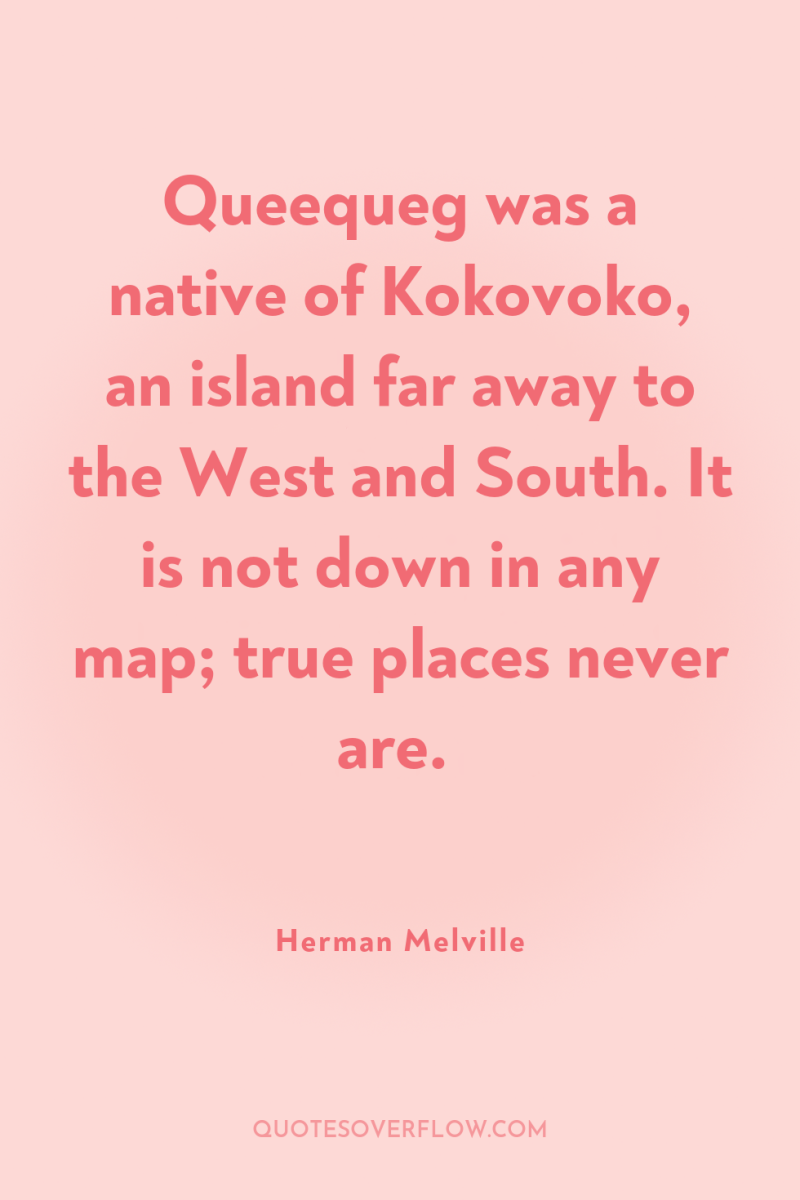
Queequeg was a native of Kokovoko, an island far away to the West and South. It is not down in any map; true places never are.Herman Melville
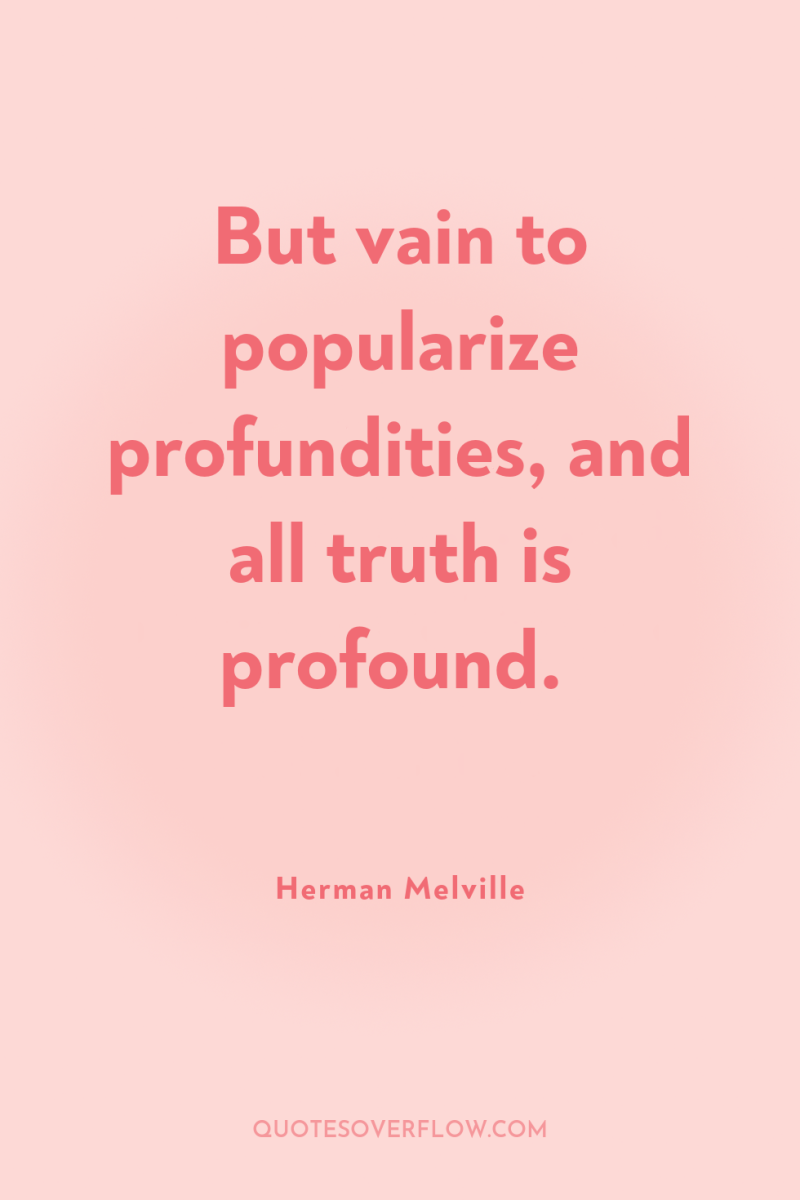
But vain to popularize profundities, and all truth is profound.Herman Melville
The sea had jeeringly kept his finite body up, but drowned the infinite of his soul. Not drowned entirely, though. Rather carried down alive to wondrous depths, where strange shapes of the unwarped primal world glided to and fro before his passive eyes; and the miser-merman, Wisdom, revealed his hoarded heaps; and among the joyous, heartless, ever-juvenile eternities, Pip saw the multitudinous, God-omnipresent, coral insects, that out of the firmament of waters heaved the colossal orbs. He saw God’s foot upon the treadle of the loom, and spoke it; and therefore his shipmates called him mad. So man’s insanity is heaven’s sense; and wandering from all mortal reason, man comes at last to that celestial thought, which, to reason, is absurd and frantic; and weal or woe, feels then uncompromised, indifferent as his God.Herman Melville
Give not thyself up, then, to fire, lest it invert thee, deaden thee, as for the time it did me. There is a wisdom that is woe; but there is a woe that is madness.Herman Melville
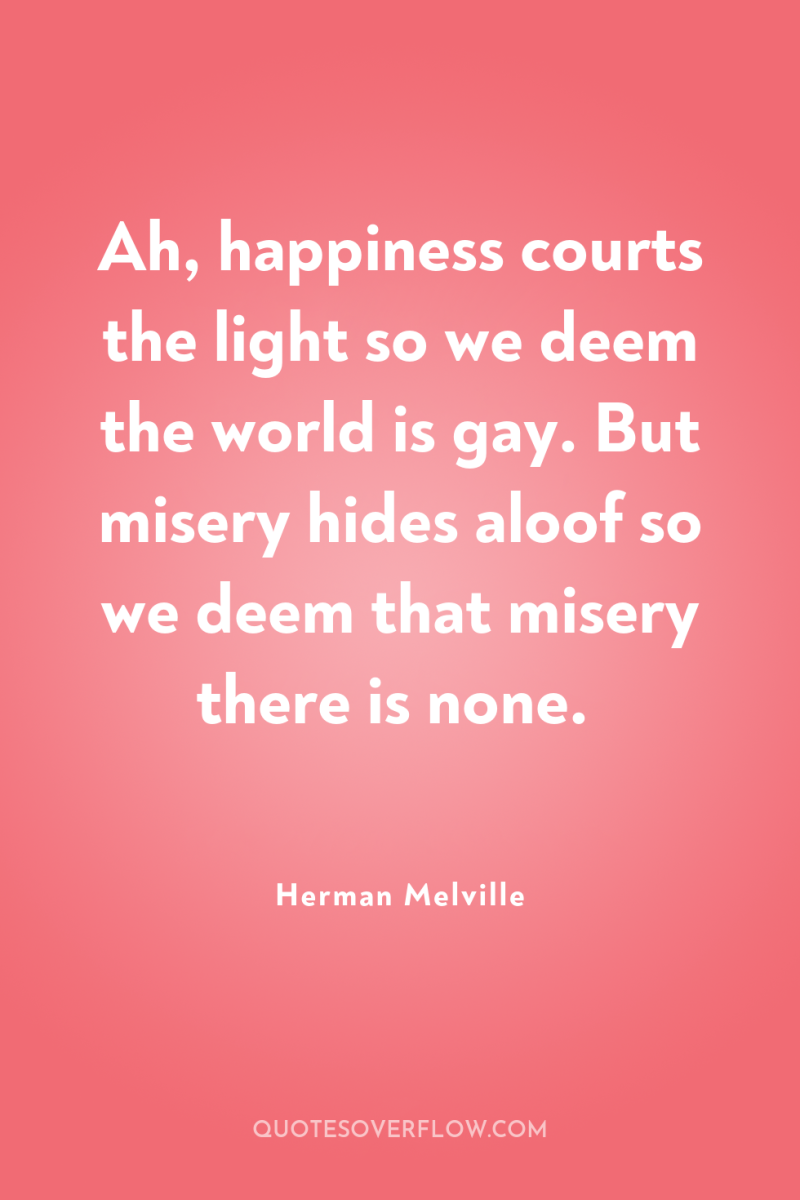
Ah, happiness courts the light so we deem the world is gay. But misery hides aloof so we deem that misery there is none.Herman Melville
One often hears of writers that rise and swell with their subject, though it may seem but an ordinary one. How, then, with me, writing of this Leviathan? Unconsciously my chirography expands into placard capitals. Give me a condor's quill! Give me Vesuvius' crater for an inkstand! Friends, hold my arms! For in the mere act of penning my thoughts of this Leviathan, they weary me, and make me faint with their out-reaching comprehensiveness of sweep, as if to include the whole circle of the sciences, and all the generations of whales, and men, and mastodons, past, present, and to come, with all the revolving panoramas of empire on earth, and throughout the whole universe, not excluding its suburbs. Such, and so magnifying, is the virtue of a large and liberal theme! We expand to its bulk. To produce a mighty book, you must choose a mighty theme. No great and enduring volume can ever be written on the flea, though many there be who have tried it.Herman Melville

To produce a mighty book, you must choose a mighty theme.Herman Melville

Better to sleep with a sober cannibal than a drunk Christian.Herman Melville
But what is worship? thought I. Do you suppose now, Ishmael, that the magnanimous God of heaven and earth–pagans and all included–can possibly be jealous of an insignificant bit of black wood? Impossible! But what is worship?–to do the will of God–that is worship. And what is the will of God?–to do to my fellow man what I would have my fellow man to do to me–that is the will of God.Herman Melville

It is better to fail in originality than to succeed in imitation.Herman Melville
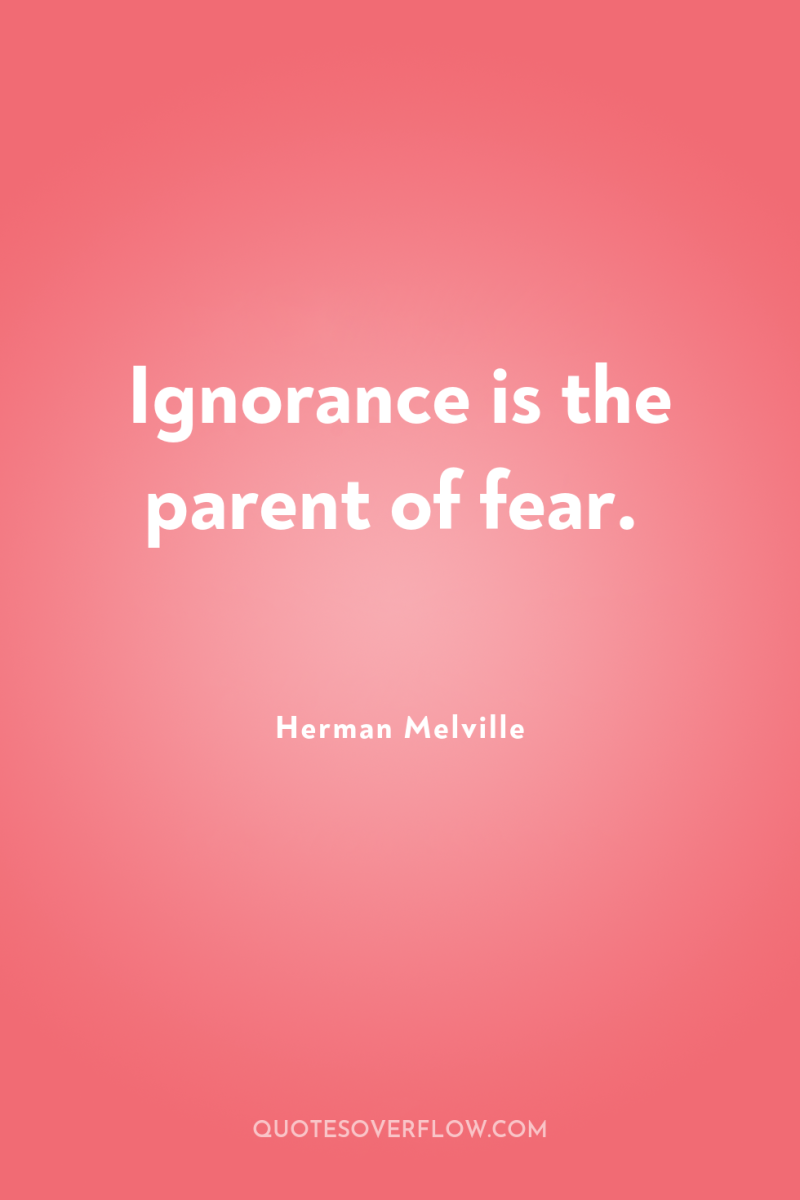
Ignorance is the parent of fear.Herman Melville
Give not thyself up, then, to fire, lest it invert thee, deaden thee; as for the time it did me. There is a wisdom that is woe; but there is a woe that is madness. And there is a Catskill eagle in some souls that can alike dive down into the blackest gorges, and soar out of them again and become invisible in the sunny spaces. And even if he for ever flies within the gorge, that gorge is in the mountains; so that even in his lowest swoop the mountain eagle is still higher than other birds upon the plain, even though they soar. .Herman Melville
![[T]hen all collapsed, and the great shroud of the sea...](https://cdn.quotesoverflow.com/file/quotesoverflow/images/then-all-collapsed-and-the-great398490518628-1200.webp)
[T]hen all collapsed, and the great shroud of the sea rolled on as it rolled five thousand years ago.Herman Melville
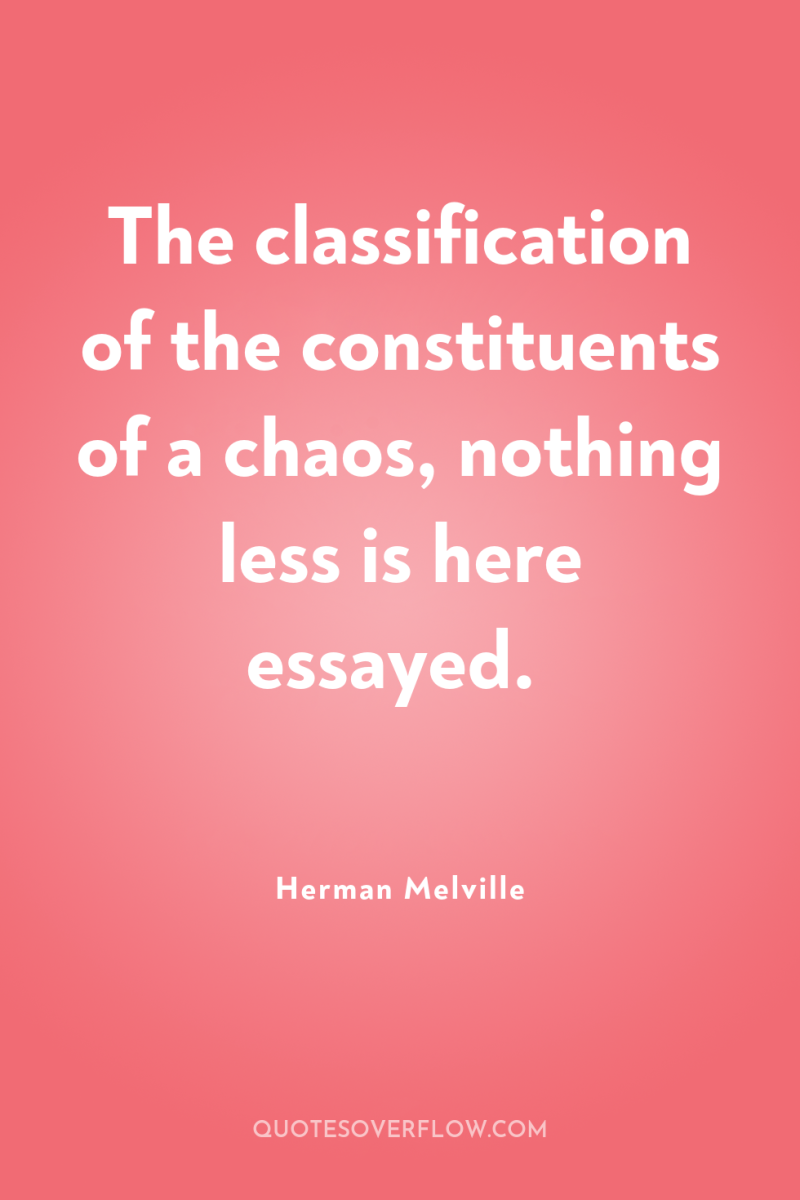
The classification of the constituents of a chaos, nothing less is here essayed.Herman Melville
All men live enveloped in whale-lines. All are born with halters round their necks; but it is only when caught in the swift, sudden turn of death, that mortals realize the silent, subtle, ever-present perils of life. And if you be a philosopher, though seated in the whale-boat, you would not at heart feel one whit more of terror, than though seated before your evening fire with a poker, and not a harpoon, by your side.Herman Melville
All men live enveloped in whale-lines. All are born with halters round their necks; but it is only when caught in the swift, sudden turn of death, that mortals realize the silent, subtle, ever-present perils of life.Herman Melville
The fiendlike skill we display in the invention of all manner of death-dealing engines, the vindictiveness with which we carry on our wars, and the misery and desolation that follow in their train, are enough of themselves to distinguish the white civilized man as the most ferocious animal on the face of the earth.Herman Melville
Nor, perhaps, will it fail to be eventually perceived, that behind those forms and usages, as it were, he sometimes masked himself; incidentally making use of them for other and more private ends than they were legitimately intended to subserve. That certain sultanism of his brain, which had otherwise in a good degree remained unmanifested; through those forms that same sultanism became incarnate in an irresistible dictatorship. For be a man’s intellectual superiority what it will, it can never assume the practical, available supremacy over other men, without the aid of some sort of external arts and entrenchments, always, in themselves, more or less paltry and base. This it is, that for ever keeps God’s true princes of the Empire from the world’s hustings; and leaves the highest honors that this air can give, to those men who become famous more through their infinite inferiority to the choice hidden handful of the Divine Inert, than through their undoubted superiority over the dead level of the mass. Such large virtue lurks in these small things when extreme political superstitions invest them, that in some royal instances even to idiot imbecility they have imparted potency. But when, as in the case of Nicholas the Czar, the ringed crown of geographical empire encircles an imperial brain; then, the plebeian herds crouch abased before the tremendous centralization. Nor, will the tragic dramatist who would depict mortal indomitableness in its fullest sweep and direct swing, ever forget a hint, incidentally so important in his art, as the one now alluded to. .Herman Melville
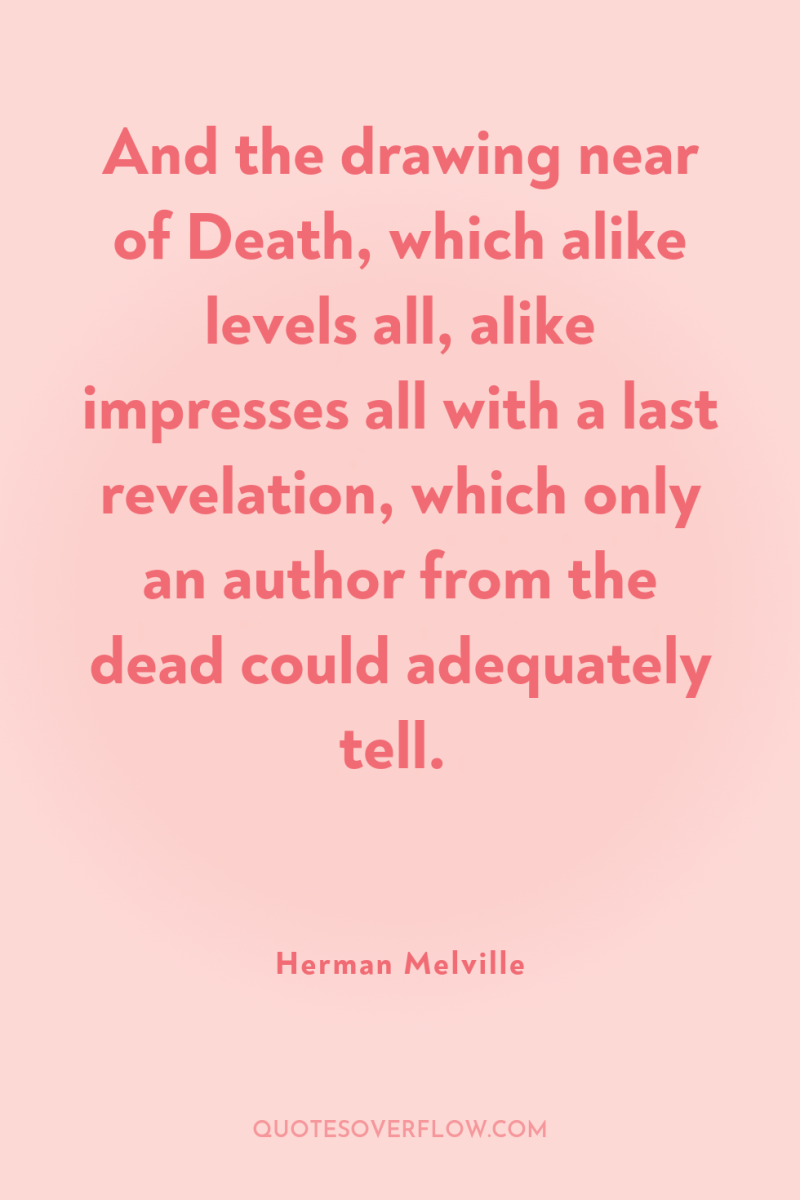
And the drawing near of Death, which alike levels all, alike impresses all with a last revelation, which only an author from the dead could adequately tell.Herman Melville
…for it is often to be observed of the shallower men, that they are the very last to despond. It is the glory of the bladder that nothing can sink it; it is the reproach of a box of treasure, that once overboard it must drownHerman Melville
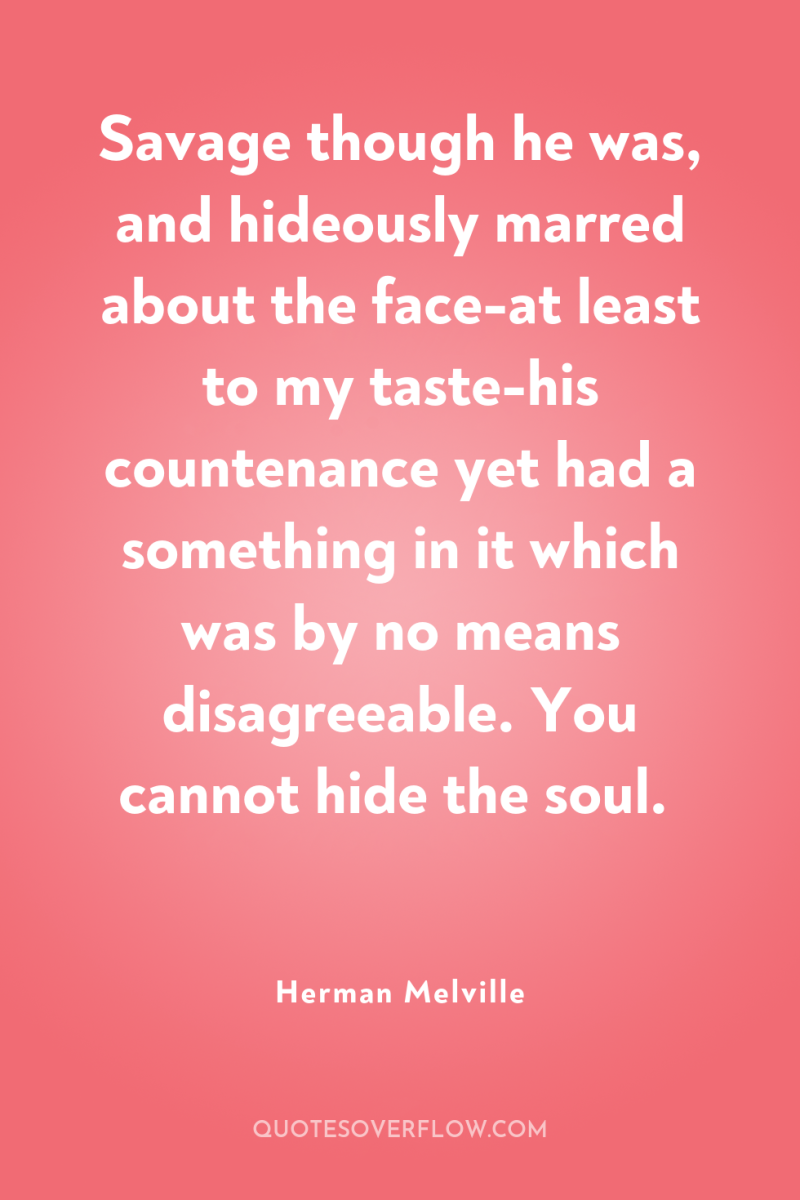
Savage though he was, and hideously marred about the face-at least to my taste-his countenance yet had a something in it which was by no means disagreeable. You cannot hide the soul.Herman Melville
Now, as you well know, it is not seldom the case in this conventional world of ours - watery or otherwise; that when a person placed in command over his fellow-men finds one of them to be very significantly his superior in general pride of manhood, straightway against that man he conceives an unconquerable dislike and bitterness; and if he have a chance he will pull down and pulverize that subaltern's tower, and make a little heap of dust of it.Herman Melville
[T]here is no folly of the beasts of the earth which is not infinitely outdone by the madness of men.Herman Melville
Consider the subtleness of the sea; how its most dreaded creatures glide under water, unapparent for the most part, and treacherously hidden beneath the loveliest tints of azure..... Consider all this; and then turn to this green, gentle , and most docile earth; consider them both, the sea and the land; and do you not find a strange analogy to something in yourself?Herman Melville
At such times, under an abated sun; afloat all day upon smooth, slow heaving swells; seated in his boat, light as a birch canoe; and so sociably mixing with the soft waves themselves, that like hearth-stone cats they purr against the gunwale; these are the times of dreamy quietude, when beholding the tranquil beauty and brilliancy of the ocean's skin, one forgets the tiger heart that pants beneath it; and would not willingly remember, that this velvet paw but conceals a remorseless fang.Herman Melville
To a sensitive being, pity is not seldom pain.Herman Melville
Ahab and aguish lay stretched together in one hammock.Herman Melville
I'll try a pagan friend, thought I, since Christian kindness has proved but hollow courtesy.Herman Melville
Is it not curious, that so vast a being as the whale should see the world through so small an eye, and hear the thunder through an ear which is smaller than a hare's? But if his eyes were broad as the lens of Herschel's great telescope; and his ears capacious as the porches of cathedrals; would that make him any longer of sight, or sharper of hearing? Not at all.- Why then do you try to 'enlarge' your mind? Subtilize it.Herman Melville
You cannot spill a drop of American blood without spilling the blood of the whole world.... We are not a nation, so much as a world.Herman Melville
When I go to sea, I go as a simple sailor, right before the mast, plumb down into the forecastle, aloft there to the royal mast-head. True, they rather order me about some, and make me jump from spar to spar, like a grasshopper in a May meadow. And at first, this sort of thing is unpleasant enough. It touches one's sense of honor, particularly if you come of an old established family in the land, the van Rensselaers, or Randolphs, or Hardicanutes. And more than all, if just previous to putting your hand into the tar-pot, you have been lording it as a country schoolmaster, making the tallest boys stand in awe of you. The transition is a keen one, I assure you, from the schoolmaster to a sailor, and requires a strong decoction of Seneca and the Stoics to enable you to grin and bear it. But even this wears off in time. What of it, if some old hunks of a sea-captain orders me to get a broom and sweep down the decks? What does that indignity amount to, weighed, I mean, in the scales of the New Testament? Do you think the archangel Gabriel thinks anything the less of me, because I promptly and respectfully obey that old hunks in that particular instance? Who ain't a slave? Tell me that. Well, then, however the old sea-captains may order me about–however they may thump and punch me about, I have the satisfaction of knowing that it is all right; that everybody else is one way or other served in much the same way–either in a physical or metaphysical point of view, that is; and so the universal thump is passed round, and all hands should rub each other's shoulder-blades, and be content.Herman Melville
... an utterly fearless man is a far more dangerous comrade than a coward.Herman Melville
... the most reliable and useful courage was that which arises from the fair estimation of the encountered peril,Herman Melville
Ahab still stood like an anvil, receiving every shock, but without the least quivering of his own.Herman Melville
Looking into his eyes, you seemed to see there the yet lingering images of those thousand-fold perils he had calmly confronted through life. A staid, steadfast man, whose life for the most part was a telling pantomime of action, and not a tame chapter of sounds.Herman Melville
Though I cannot tell why it was exactly that those stage managers, the Fates, put me down for this shabby part of a whaling voyage, when others were set down for magnificent parts in high tragedies, and short and easy parts in genteel comedies, and jolly parts in faces–though I cannot tell why this was exactly; yet, now that I recall all the circumstances, I think I can see a little into the springs and motives which being cunningly presented to me under various disguises, induced me to set about performing the part I did, besides cajoling me into the delusion that it was a choice resulting from my own unbiased freewill and discriminating judgment.Herman Melville
Come what will, one comfort's always left – that unfailing comfort is, it's all predestinated.Herman Melville
A man thinks that by mouthing hard words he understands hard things.Herman Melville
Whenever I find myself growing grim about the mouth; whenever it is a damp, drizzly November in my soul; whenever I find myself involuntarily pausing before coffin warehouses, and bringing up the rear of every funeral I meet; and especially whenever my hypos get such an upper hand of me, that it requires a strong moral principle to prevent me from deliberately stepping into the street, and methodically knocking people's hats off - then, I account it high time to get to sea as soon as I can.Herman Melville
So far gone am I in the dark side of earth, that its other side, the theoretic bright one, seems but uncertain twilight to me.Herman Melville
The White Whale swam before him as the monomaniac incarnation of all those malicious agencies which some deep men feel eating them, till they are left living with half a heart and half a lung.Herman Melville
The sun hides not the ocean, which is the dark side of this earth, and which is two thirds of this earth. So, therefore, that mortal man who hath more of joy than sorrow in him, that mortal man cannot be true-- not true, or undeveloped. With books the same. The truest of all men was the Man of Sorrows, and the truest of all books is Solomon’s, and Ecclesiastes is the fine hammered steel of woe. .Herman Melville
For, thought Ahab, while even the highest earthly felicities ever have a certain unsignifying pettiness lurking in them, but, at bottom, all heartwoes, a mystic significance, and, in some men, an archangelic grandeur; so do their diligent tracings-out not belie the obvious deduction. To trail the genealogies of these high mortal miseries, carries us at last among the sourceless primogenitures of the gods; so that, in the face of all the glad, hay-making suns, and soft-cymballing, round harvest-moons, we must needs give in to this: that the gods themselves are not for ever glad. The ineffaceable, sad birthmark in the brow of man, is but the stamp of sorrow in the signers.Herman Melville
For, thought Ahab, while even the highest earthly felicities ever have a certain unsignifying pettiness lurking in them, but, at bottom, all heartwoes, a mystic significance, and, in some men, an archangelic grandeur; so do their diligent tracings-out not blue the obvious deduction. To trail the genealogies of these high mortal miseries, carries us at last among the sourceless primogenitures of the gods; so that, in the face of all the glad, hay-making suns, and the softcymballing, round the harvest-moons, we must needs give in to this: that the gods themselves are not for ever glad. The ineffaceable, sad birth-mark in the brow of man, is but the stamp of sorrow in the signers.Herman Melville
Close! stand close to me, Starbuck; let me look into a human eye; it is better than to gaze into sea or sky; better than to gaze upon God. By the green land; by the bright hearthstone! this is the magic glass, man; I see my wife and my child in thine eye. No, no; stay on board, on board! - lower not when I do; when branded Ahab gives chase to Moby Dick. That hazard shall not be thine. No, no! not with the far away home I see in that eye! .Herman Melville
There is no steady unretracing progress in this life; we do not advance through fixed gradations, and at the last one pause: - through infancy's unconscious spell, boyhood's thoughtless faith, adolescence' doubt (the common doom). and then scepticism, then disbelief, resting at last in manhood's pondering repose of If.Herman Melville
So true it is, and so terrible, too, that up to a certain point the thought or sight of misery enlists our best affections; but, in certain special cases, beyond that point it does not. they err who would assert that invariable this is owing to the inherent selfishness of the human heart. It rather proceeds from a certain hopelessness of remedying excessive and organic ill. To a sensitive being, pity is not seldom pain. An when at last it is perceived that such pity cannot lead to effectual succor, common sense bides the soul be rid of it.Herman Melville
Who ain't a slave? Tell me that... I have the satisfaction of knowing that it is all right; that everybody else is one way or other served in much the same way–either in a physical or metaphysical point of view, that is; and so the universal thump is passed round, and all hands should rub each other's shoulder-blades, and be content.Herman Melville
I would prefer not to.Herman Melville
...then the rushing Pequod, freighted with savages, and laden with fire, and burning a corpse, and plunging into that blackness of darkness, seemed the material counterpart of her monomaniac commander's soul.Herman Melville
Of all the preposterous assumptions of humanity over humanity, nothing exceeds most of the criticisms made on the habits of the poor by the well-housed, well- warmed, and well-fed.Herman Melville
Do not presume, well-housed, well-warmed, and well-fed, to criticize the poorHerman Melville
I know not all that may be coming, but be it what it will, I'll go to it laughing.Herman Melville
I love to sail forbidden seas, and land on barbarous coasts.Herman Melville
I love to sail forbidden seas and land on barbarous coasts.Herman Melville
His three boats stove around him, and oars and men both whirling in the eddies; one captain, seizing the line-knife from his broken prow, had dashed at the whale, as an Arkansas duellist at his foe, blindly seeking with a six inch blade to reach the fathom-deep life of the whale. That captain was Ahab. And then it was, that suddenly sweeping his sickle-shaped lower jaw benieath him, Moby Dick had reaped away Ahab's leg.Herman Melville
Ahab is for ever Ahab, man. This whole act's immutably decreed. 'Twas rehearsed by thee and me a billion years before this ocean rolled. Fool! I am the Fates' lieutenant, I act under orders.Herman Melville
Is Ahab, Ahab? Is it I, God, or who, that lifts this arm? But if the great sun move not of himself; but is an errand-boy in heaven; nor one single star can revolve, but by some invisible power; how then can this one small heart beat; this one small brain think thoughts; unless God does that beating, does that thinking, does that living, and not I.Herman Melville
The frenzies of the chase had by this time worked them bubblingly up, like old wine worked anew. Whatever pale fears and forebodings some of them might have felt before; these were not only now kept out of sight through the growing awe of Ahab, but they were broken up, and on all sides routed, as timid prairie hares that scatter before the bounding bison. The hand of Fate had snatched all their souls; and by the stirring perils of the previous day; the rack of the past night's suspense; the fixed, unfearing, blind, reckless way in which their wild craft went plunging towards its flying mark; by all these things, their hearts were bowled along. The wind that made great bellies of their sails, and rushed the vessel on by arms invisible as irresistible; this seemed the symbol of that unseen agency which so enslaved them to the race. They were one man, not thirty. For as the one ship that held them all; though it was put together of all contrasting things – oak, and maple, and pine wood; iron, and pitch, and hemp – yet all these ran into each other in the one concrete hull, which shot on its way, both balanced and directed by the long central keel; even so, all the individualities of the crew, this man's valor, that man's fear; guilt and guiltiness, all varieties were welded into oneness, and were all directed to that fatal goal which Ahab their one lord and keel did point to. The rigging lived. The mast-heads, like the tops of tall palms, were outspreadingly tufted with arms and legs. Clinging to a spar with one hand, some reached forth the other with impatient wavings; others, shading their eyes from the vivid sunlight, sat far out on the rocking yards; all the spars in full bearing of mortals, ready and ripe for their fate. Ah! how they still strove through that infinite blueness to seek out the thing that might destroy them!.Herman Melville
With no power to annul the elemental evil in him, though readily enough he could hide it; apprehending the good, but powerless to be it; a nature like Claggart’s, surcharged with energy as such natures almost invariably are, what recourse is left to it but to recoil upon itself and, like the scorpion for which the Creator alone is responsible, act out to the end the part allotted it.Herman Melville
To be enraged with a dumb thing, Captain Ahab, seems blasphemous.Herman Melville
One captain, seizing the line-knife from his broken prow, had dashed at the whale, as an Arkansas duelist at his foe, blindly seeking with a six-inch blade to reach the fathom-deep life of the whale. That captain was Ahab.Herman Melville
For whatever is truly wondrous and fearful in man, never yet was put into words or books.Herman Melville
However baby man may brag of his science and skill, and however much, in a flattering future, that science and skill may augment; yet for ever and for ever, to the crack of doom, the sea will insult and murder him, and pulverize the stateliest, stiffest frigate he can make; nevertheless, by the continual repetition of these very impressions, man has lost that sense of the full awfulness of the sea which aboriginally belongs to it.Herman Melville
Thought he, it's a wicked world in all meridians; I'll die a pagan.Herman Melville
Ignorance is the parent of fear ...Herman Melville
Thy silence, then that voices thee.Herman Melville
Is it that by its indefiniteness it shadows forth the heartless voids and immensities of the universe, and thus stabs us from behind with the thought of annihilation, when beholding the white depths of the milky way? Or is it, that as in essence whiteness is not so much a color as the visible absence of color; and at the same time the concrete of all colors; is it for these reasons that there is such a dumb blankness, full of meaning, in a wide landscape of snows- a colorless, all-color of atheism from which we shrink? And when we consider that other theory of the natural philosophers, that all other earthly hues – every stately or lovely emblazoning – the sweet tinges of sunset skies and woods; yea, and the gilded velvets of butterflies, and the butterfly cheeks of young girls; all these are but subtile deceits, not actually inherent in substances, but only laid on from without; so that all deified Nature absolutely paints like the harlot, whose allurements cover nothing but the charnel-house within; and when we proceed further, and consider that the mystical cosmetic which produces every one of her hues, the great principle of light, for ever remains white or colorless in itself, and if operating without medium upon matter, would touch all objects, even tulips and roses, with its own blank tinge – pondering all this, the palsied universe lies before us a leper; and like wilful travellers in Lapland, who refuse to wear colored and coloring glasses upon their eyes, so the wretched infidel gazes himself blind at the monumental white shroud that wraps all the prospect around him. And of all these things the Albino whale was the symbol. Wonder ye then at the fiery hunt? .Herman Melville
It was a black and hooded head; and hanging there in the midst of so intense a calm, it seemed the Sphynx’s in the desert. “Speak, thou vast and venerable head, ” muttered Ahab, “which, though ungarnished with a beard, yet here and there lookest hoary with mosses; speak, mighty head, and tell us the secret thing that is in thee. Of all divers, thou hast dived the deepest. That head upon which the upper sun now gleams, has moved amid this world’s foundations. Where unrecorded names and navies rust, and untold hopes and anchors rot; where in her murderous hold this frigate earth is ballasted with bones of millions of the drowned; there, in that awful water-land, there was thy most familiar home. Thou hast been where bell or diver never went; hast slept by many a sailor’s side, where sleepless mothers would give their lives to lay them down. Thou saw’st the locked lovers when leaping from their flaming ship; heart to heart they sank beneath the exulting wave; true to each other, when heaven seemed false to them. Thou saw’st the murdered mate when tossed by pirates from the midnight deck; for hours he fell into the deeper midnight of the insatiate maw; and his murderers still sailed on unharmed–while swift lightnings shivered the neighboring ship that would have borne a righteous husband to outstretched, longing arms. O head! thou hast seen enough to split the planets and make an infidel of Abraham, and not one syllable is thine! .Herman Melville
I promise nothing complete; because any human thing supposed to be complete, must not for that very reason infallibly be faulty.Herman Melville
But pity there was none. For all his old age, and his one arm, and his blind eyes, he must die the death and be murdered, in order to light the gay bridals and other merry-makings of men, and also to illuminate the solemn churches that preach unconditional inoffensiveness by all to all.Herman Melville
Often ill comes from the good, as good from ill.Herman Melville
...flight from tyranny does not of itself insure a safe asylum, far less a happy home.Herman Melville
Be sure of this, O young ambition, all mortal greatness is but disease.Herman Melville
War yet shall be, but warriors are now operatives; war's made less grand than peace.Herman Melville
In one word, Queequeg, said I, rather digressively; hell is an idea first born on an undigested apple-dumpling; and since then perpetuated through the hereditary dyspepsias nurtured by Ramadans.Herman Melville
Oh, Starbuck! it is a mild, mild wind, and a mild looking sky. On such a day - very much such a sweetness as this - I struck my first whale - a boy-harpooneer of eighteen! Forty - forty - forty years ago! - ago! Forty years of continual whaling! forty years of privation, and peril, and storm-time! forty years on the pitiless sea! for forty years has Ahab forsaken the peaceful land, for forty years to make war on the horrors of the deep! Aye and yes, Starbuck, out of those forty years I have not spent three ashore. When I think of this life I have led; the desolation of solitude it has been; the masoned, walled-town of a Captain's exclusiveness, which admits but small entrance to any sympathy from the green country without - oh, weariness! heaviness! Guinea-coast slavery of solitary command! - when I think of all this; only half-suspected, not so keenly known to me before - and how for forty years I have fed upon dry salted fare - fit emblem of the dry nourishment of my soul - when the poorest landsman has had fresh fruit to his daily hand, and broken the world's fresh bread to my mouldy crusts - away, whole oceans away, from that young girl-wife I wedded past fifty, and sailed for Cape Horn the next day, leaving but one dent in my marriage pillow - wife? wife? - rather a widow with her husband alive! Aye, I widowed that poor girl when I married her, Starbuck; and then, the madness, the frenzy, the boiling blood and the smoking brow, with which, for a thousand lowerings old Ahab has furiously, foamingly chased his prey - more a demon than a man! - aye, aye! what a forty years' fool - fool - old fool, has old Ahab been! Why this strife of the chase? why weary, and palsy the arm at the oar, and the iron, and the lance? how the richer or better is Ahab now? Behold. Oh, Starbuck! is it not hard, that with this weary load I bear, one poor leg should have been snatched from under me? Here, brush this old hair aside; it blinds me, that I seem to weep. Locks so grey did never grow but from out some ashes! But do I look very old, so very, very old, Starbuck? I feel deadly faint, bowed, and humped, as though I were Adam, staggering beneath the piled centuries since Paradise. God! God! God! - crack my heart! - stave my brain! - mockery! mockery! bitter, biting mockery of grey hairs, have I lived enough joy to wear ye; and seem and feel thus intolerably old? Close! stand close to me, Starbuck; let me look into a human eye; it is better than to gaze into sea or sky; better than to gaze upon God. By the green land; by the bright hearth-stone! this is the magic glass, man; I see my wife and my child in thine eye. No, no; stay on board, on board! - lower not when I do; when branded Ahab gives chase to Moby Dick. That hazard shall not be thine. No, no! not with the far away home I see in that eye!.Herman Melville
That mortal man who hath more of joy than sorrow in him, that mortal man cannot be true – not true, or undeveloped. With books the same. The truest of all men was the Man of Sorrows, and the truest of all books is Solomon’s, and Ecclesiastes is the fine hammered steel of woe. “All is vanity.” ALL. This wilful world hath not got hold of unchristian Solomon’s wisdom yet.Herman Melville
So, cutting the lashing of the waterproof match keg, after many failures Starbuck contrived to ignite the lamp in the lantern; then stretching it on a waif pole, handed it to Queequeg as the standard-bearer of this forlorn hope. There, then, he sat, holding up that imbecile candle in the heart of that almighty forlornness. There, then, he sat, the sign and symbol of a man without faith, hopelessly holding up hope in the midst of despair.Herman Melville
What is it, what nameless, inscrutable, unearthly thing is it; what cozening, hidden lord and master, and cruel, remorseless emperor commands me; that against all natural loving and longings, I so keep pushing, and crowding, and jamming myself on all the time; recklessly making me ready to do what in my own proper, natural heart, I durst not so much as dare?Herman Melville
Nippers was a whiskered, sallow, and, upon the whole, rather piratical-looking young man of about five and twenty. I always deemed him the victim of two evil powers – ambition and indigestion.Herman Melville
Are not half our lives spent in reproaches for foregone actions, of the true nature and consequences of which we were wholly ignorant at the time?Herman Melville
Of all tools used in the shadow of the moon, men are the most apt to get out of order.Herman Melville
But though, to landsmen in general, the native inhabitants of the seas have ever regarded with emotions unspeakably unsocial and repelling; though we know the sea to be an everlasting terra incognita, so that Columbus sailed over numberless unknown worlds to discover his one superficial western one; though, by vast odds, the most terrific of all mortal disasters have immemorially and indiscriminately befallen tens and hundreds of thousands of those who have gone upon the waters; though but a moment’s consideration will teach that, however baby man may brag of his science and skill, and however much, in a flattering future, that science and skill may augment; yet for ever and for ever, to the crack of doom, the sea will insult and murder him, and pulverize the stateliest, stiffest frigate he can make; nevertheless, by the continual repetition of these very impressions, man has lost that sense of the full awfulness of the sea which aboriginally belongs to it.Herman Melville
...the great floodgates of the wonder-world swung open...Herman Melville
At last the anchor was up, the sails were set, and off we glided. It was a short, cold Christmas; and as the short northern day merged into night, we found ourselves almost broad upon the wintry ocean, whose freezing spray cased us in ice, as in polished armor. The long rows of teeth on the bulwarks glistened in the moonlight; and like the white ivory tusks of some huge elephant, vast curving icicles depended from the bows.Herman Melville
Human madness is oftentimes a cunning and most feline thing. When you think it fled, it may have but become transfigured into some still subtler form.Herman Melville
All my means are sane, my motive and my object mad.Herman Melville
All are born with halters round their necks; but it is only when caught in the swift, sudden turn of death, that mortals realize the silent, subtle, ever-present perils of life.Herman Melville
Glimpses do ye seem to see of that mortally intolerable truth; that all deep, earnest thinking is but the intrepid effort of the soul to keep the open independence of her sea; while the wildest winds of heaven and earth conspire to cast her on the treacherous, slavish shore.Herman Melville
Here, brush this old hair aside; it blinds me, that I seem to weep. Locks so grey did never grow but from out some ashes! But do I look very old, so very, very old, Starbuck? I feel deadly faint, bowed, and humped, as though I were Adam, staggering beneath the piled centuries since Paradise.Herman Melville
How I wish I could fist a bit of old-fashioned beef in the fore-castle, as I used to when i was before the mast.Herman Melville
Genius is full of trash.Herman Melville
It does seem to me, that herein we see the rare virtue of a strong individual vitality, and the rare virtue of thick walls, and the rare virtue of interior spaciousness. Oh, man! admire and model thyself after the whale! Do thou, too, remain warm among ice. Do thou, too, live in this world without being of it. Be cool at the equator; keep thy blood fluid at the Pole. Like the great dome of St. Peter's, and like the great whale, retain, O man! in all seasons a temperature of thine own.Herman Melville
There is, one knows not what sweet mystery about this sea, whose gently awful stirrings seem to speak of some hidden soul beneath...Herman Melville
Call me Ishmael. Some years ago--never mind how long precisely--having little or no money in my purse, and nothing particular to interest me on shore, I thought I would sail about a little and see the watery part of the world. It is a way I have of driving off the spleen and regulating the circulation. Whenever I find myself growing grim about the mouth; whenever it is a damp, drizzly November in my soul; whenever I find myself involuntarily pausing before coffin warehouses, and bringing up the rear of every funeral I meet; and especially whenever my hypos get such an upper hand of me, that it requires a strong moral principle to prevent me from deliberately stepping into the street, and methodically knocking people's hats off--then, I account it high time to get to sea as soon as I can. This is my substitute for pistol and ball. With a philosophical flourish Cato throws himself upon his sword; I quietly take to the ship. There is nothing surprising in this. If they but knew it, almost all men in their degree, some time or other, cherish very nearly the same feelings towards the ocean with me. There now is your insular city of the Manhattoes, belted round by wharves as Indian isles by coral reefs--commerce surrounds it with her surf. Right and left, the streets take you waterward. Its extreme downtown is the battery, where that noble mole is washed by waves, and cooled by breezes, which a few hours previous were out of sight of land. Look at the crowds of water-gazers there. Circumambulate the city of a dreamy Sabbath afternoon. Go from Corlears Hook to Coenties Slip, and from thence, by Whitehall, northward. What do you see?-- Posted like silent sentinels all around the town, stand thousands upon thousands of mortal men fixed in ocean reveries. Some leaning against the spiles; some seated upon the pier-heads; some looking over the bulwarks of ships from China; some high aloft in the rigging, as if striving to get a still better seaward peep. But these are all landsmen; of week days pent up in lath and plaster--tied to counters, nailed to benches, clinched to desks. How then is this? Are the green fields gone? What do they here? But look! here come more crowds, pacing straight for the water, and seemingly bound for a dive. Strange! Nothing will content them but the extremest limit of the land; loitering under the shady lee of yonder warehouses will not suffice. No. They must get just as nigh the water as they possibly can without falling in. And there they stand--miles of them--leagues. Inlanders all, they come from lanes and alleys, streets and avenues--north, east, south, and west. Yet here they all unite. Tell me, does the magnetic virtue of the needles of the compasses of all those ships attract them thither? Once more. Say you are in the country; in some high land of lakes. Take almost any path you please, and ten to one it carries you down in a dale, and leaves you there by a pool in the stream. There is magic in it. Let the most absent-minded of men be plunged in his deepest reveries--stand that man on his legs, set his feet a-going, and he will infallibly lead you to water, if water there be in all that region. Should you ever be athirst in the great American desert, try this experiment, if your caravan happen to be supplied with a metaphysical professor. Yes, as every one knows, meditation and water are wedded for ever. .Herman Melville
At last I see it, I feel it; I penetrate to the predestinated purpose of my life. I am content. Others may have loftier parts to enact; but my mission in this world, Bartleby, is to furnish you with office-room for such period as you may see fit to remain. I believe that this wise and blessed frame of mind would have continued with me, had it not been for the unsolicited and uncharitable remarks obtruded upon me by my professional friends who visited the rooms. But thus it often is, that the constant friction of illiberal minds wears out at last the best resolves of the more generous.Herman Melville